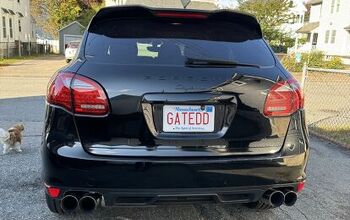Detroit: Small Car Renaissance Right Around The Corner
When you're running in the back of the pack, it's almost impossible to take the lead. Detroit has learned this painful lesson in the small car market, but they're planning a compact comeback with spiffy new models like the Ford Focus, Holden Vauxhall Opel Saturn Astra and … uh… can I get back to you on that? Even though the imported brands have been giving us high-quality small cars for years, Forbes reports Ford and GM research "shows [them] that small-car buyers will no longer tolerate flimsy seats, cheap plastic dashboards, noisy engines and bumpy rides." (They must have finally driven a Honda.) This epiphany isn't lost on Saturn's general manager Jill Lajdziak who said, "People who go into a small car want expressive design and they want a level of refinement in the interior. We've got to make sure that our small cars are delivering what they want. They don't want to compromise." Ford CEO Alan Mulally admits his benefactors have a problem too: "It's a segment that we've been out of, so we need to have really good products in it. We missed a whole generation of Ford products. We knew the trucks and the SUVs, No. 1 in the world, but they grew up with Civics and Accords." That's all well and good, Al and Jill; the first step to curing a problem is admitting you have one. But when you're trying to hit a moving target, finally figuring out you need some ammo isn't enough; you have to aim in front of it, not at it.
More by Frank Williams

































Comments
Join the conversation
I think the Big 2.8 (well, at least Ford and GM) get it, but unfortunately, like everything else, they are slow to deliver. Really, the only thing the new Focus lacks is an exterior with some sort of design cohesion. I rented one on my last business trip - that thing is quiet, the interior is better than anything in its class in my opinion, the handling is crisp, the engine responsive. Sitting on the inside of that car, the Civic is trumped... but that outside. Ford's next B-car, however, will be very good. We're getting the Euro version with a different nose for crash standards. I just wish they could get it here in mid-2008 when it launches in Europe instead of in mid-2009. The Saturn Astra will be a very good car, I think. Again, like the Fiesta, it is GM's European model. GM also has the Aveo, and while the old 5-door model is junk, the 4-door is actually a half-way decent car. I would certainly choose it over a Yaris (although the Fit is a step up). Both companies are also working on mini-utes based on their B platforms, and I heard that the Reflex project is alive again at Ford. So, they get it. It's just they needed to really get it about 3 years ago so that these products could be out now instead of debuting in '09/'10.
Small car renaissance from Detroit? What a joke of an article. The American automakers have a lot less small cars coming to market in the next few years than compared to the Japanese. Toyota has their new Corolla coming to North America in a few months. In 2009, Honda is supposed to release a new Fit to North America. That is just to name a few of course. And on the market currently the Japanese dominate with the amount of small car offerings they have.
It is especially egregious that Ford, the company that became a global giant by building basic transportation, had to wait until Mulally arrived to be told that unappealing big(er) cars (e.g., an '05 Taurus) can't sell well against appealing small(er) cars (e.g., an Accord). Oh, we can understand why the company clung to Henry the Deuce's dictum that small cars mean small profits. Detroit believed a car's price should be in proportion to its mass. At one time there was an almost one-to-one linkage of dollars and weight: a 2,000 pound car sold for about $2,000; a two-ton car brought four grand. Thus, the Big 3's enormous fixed costs and overhead--and eventually even UAW labor became a de facto fixed cost--ensured that low-price cars would be money-losers. So the key variable wasn't content; it was mass. And the public once generally accepted that rule. In 1971 a friend bought a new BMW 1600, which was essentially a Teutonic Datsun 510 with a marvelous four-cylinder engine. Another friend asked how much it cost. Upon being told the amount (it was about $3,500, I think) the response was "Gee, for that much money I can buy an Impala!" Over time, the market changed but Detroit didn't. Or couldn't. But perhaps survival is possible. New UAW contracts will help trim costs, as will cuts in overhead and unneeded production capacity. A real breakthrough would be ending the veto power that component units (e.g., the employees who engineered the "domestic" Focus) exercised over decisions with fateful company-wide consequences. If American engineers can't design engines or transmissions as good as Toyota's or Honda's, they must be jettisoned. Sub-optimization isn't good enough in today's global competition.
While Detroit has allegedly learned this painful lesson in the small car market, what about the mid-size and full-size car market? In the sea of Camcords and imported crossover SUVs, Detroit is an also-ran. And the large car market is dying from neglect.